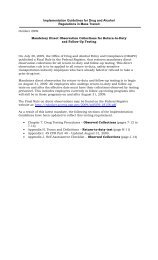What Employers Need To Know About DOT Drug and Alcohol Testing
What Employers Need To Know About DOT Drug and Alcohol Testing
What Employers Need To Know About DOT Drug and Alcohol Testing
You also want an ePaper? Increase the reach of your titles
YUMPU automatically turns print PDFs into web optimized ePapers that Google loves.
Section II. Identifying Employees <strong>Need</strong>ing <strong>To</strong> Be Tested<br />
Who are safety-sensitive employees <strong>and</strong> why are they tested?<br />
Pilots, truck drivers, subway operators, ship captains, pipeline controllers, airline mechanics, locomotive<br />
engineers, <strong>and</strong> bus drivers are just some of the transportation workers that we depend upon to be as clearheaded<br />
<strong>and</strong> as alert as possible at all times. As a safety agency, the <strong>DOT</strong> can dem<strong>and</strong> nothing less. Use of<br />
illegal drugs <strong>and</strong> misuse of alcohol are not compatible with performing these vital functions. The history of<br />
our program began with some fatal accidents that illegal drug use or alcohol misuse helped to cause. Congress<br />
passed a law – the Omnibus Transportation Employees <strong>Testing</strong> Act of 1991 – that requires <strong>DOT</strong> Agencies to<br />
test safety-sensitive transportation workers.<br />
This table lists the types of safety-sensitive duties subject to <strong>DOT</strong> drug <strong>and</strong> alcohol testing:<br />
Transportation<br />
Industry<br />
Commercial<br />
Motor Carriers<br />
(FMCSA)<br />
Aviation<br />
(FAA)<br />
Railroad<br />
(FRA)<br />
Public Transportation<br />
(FTA)<br />
Pipeline<br />
(PHMSA)<br />
Maritime (USCG)<br />
[Follows Part 40 for drug<br />
testing, not alcohol testing.]<br />
Safety-Sensitive Duties<br />
Commercial Drivers License (CDL) holders who operate a Commercial<br />
Motor Vehicle.<br />
Flight crew, flight attendants, flight instructors; air traffic controllers at<br />
facilities not operated by the FAA or under contract to the U.S. military;<br />
aircraft dispatchers; aircraft maintenance or preventative maintenance<br />
personnel; ground security coordinators <strong>and</strong> aviation screeners.<br />
Persons who perform duties subject to the Hours of Service laws; such as,<br />
locomotive engineers, trainmen, conductors, switchmen, locomotive<br />
hostlers/helpers, utility employees, signalmen, operators <strong>and</strong> train<br />
dispatchers.<br />
Operators of revenue service vehicles, CDL-holding operators of nonrevenue<br />
service vehicles, vehicle controllers, revenue service vehicle<br />
mechanics, firearm-carrying security personnel.<br />
Persons who perform operations, maintenance, or emergency response<br />
function on a pipeline or LNG facility regulated under part 192, 193, or<br />
195.<br />
Crewmembers operating a commercial vessel.<br />
<strong>What</strong> <strong>Employers</strong> <strong>Need</strong> to <strong>Know</strong> <strong>About</strong> <strong>DOT</strong> <strong>Drug</strong> <strong>and</strong> <strong>Alcohol</strong> <strong>Testing</strong> – October 1, 2010<br />
8
















